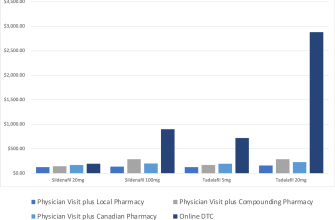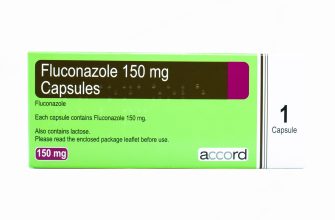Consider incorporating Lyrica into your treatment plan if you struggle with anxiety disorders. This medication, primarily used to manage nerve pain and seizures, has shown promise in alleviating symptoms of anxiety, providing relief for many individuals.
Lyrica works by modulating the release of certain neurotransmitters, effectively calming excessive neural activity. Research indicates that patients using Lyrica report lower anxiety levels, improved mood stability, and enhanced overall well-being. Regular consultation with your healthcare provider ensures that this medication suits your specific needs and conditions.
While Lyrica can be beneficial, it is essential to understand the potential side effects, which may include dizziness, fatigue, and weight gain. Monitoring your response to the medication and maintaining open communication with your doctor can help manage these effects. Explore the possibility of incorporating Lyrica into your routine for improved anxiety management and a better quality of life.
- Lyrica Nerve Medicine for Anxiety Disorder
- Dosage Recommendations
- Potential Benefits
- Understanding Lyrica: Mechanism of Action
- Indications for Use: When is Lyrica Prescribed?
- Anxiety Disorders
- Seizure Disorders
- Dosage Guidelines: How to Take Lyrica Safely
- Potential Side Effects: What to Expect
- Less Common Side Effects
- Managing Side Effects
- Interactions with Other Medications: What You Should Know
- Benefits of Lyrica for Anxiety Disorder Management
- Alternatives to Lyrica: Exploring Other Treatment Options
- Patient Experiences: What Users are Saying About Lyrica
Lyrica Nerve Medicine for Anxiety Disorder
Lyrica, or pregabalin, serves as a helpful option for managing anxiety disorders. It works by calming overactive nerves in the brain, reducing excessive neurotransmitter release. Many individuals report decreased anxiety levels and improved emotional regulation with its use.
Dosage Recommendations
Dosage varies based on individual needs, but standard guidance includes:
- Starting with a low dose, typically around 75 mg per day.
- Gradually increasing to 150 mg within a week.
- Possible adjustments beyond this based on response and tolerability.
Potential Benefits
Utilizing Lyrica can provide several advantages:
- Reduces feelings of nervousness and tension.
- Improves overall mood stability.
- Addresses associated physical symptoms like muscle tension and discomfort.
Consult a healthcare provider for personalized advice, especially regarding potential interactions with other medications or underlying health conditions. Regular follow-ups help ensure that Lyrica remains an appropriate choice for your anxiety management.
Understanding Lyrica: Mechanism of Action
Lyrica, or pregabalin, primarily acts by modulating neurotransmitter release. It binds to the alpha-2-delta subunit of voltage-gated calcium channels in the central nervous system. This action inhibits the influx of calcium ions into neurons during depolarization, effectively reducing the release of excitatory neurotransmitters like glutamate, norepinephrine, and substance P. As a result, Lyrica diminishes neuronal excitability, leading to its anxiolytic effects.
This mechanism also plays a role in pain relief, particularly in neuropathic conditions. By decreasing neurotransmitter release, Lyrica helps manage pain signals, providing relief for those suffering from conditions such as fibromyalgia and diabetic neuropathy.
Lyrica is commonly prescribed for various conditions, primarily neuropathic pain related to diabetic neuropathy, postherpetic neuralgia, and fibromyalgia. Patients experiencing these types of chronic pain often find Lyrica helpful in managing their symptoms. Medical professionals evaluate the severity and persistence of pain before initiating treatment with this medication.
Anxiety Disorders
Healthcare providers may also recommend Lyrica for generalized anxiety disorder (GAD). It helps alleviate anxiety symptoms, providing relief to those who struggle with excessive worry and stress. The mechanism of action involves modulating neurotransmitter release, which contributes to its anxiolytic properties.
Seizure Disorders
Lyrica serves as an adjunctive therapy for partial-onset seizures in adults. It helps control seizure episodes when used alongside other antiepileptic medications. Physicians consider this option for patients who require additional support in managing their seizure conditions.
Dosage Guidelines: How to Take Lyrica Safely
Always follow your healthcare provider’s instructions regarding Lyrica dosage. Typically, adults start with a dose of 75 mg per day, divided into two or three doses. Depending on how your body responds, your doctor may adjust the dosage to a maximum of 600 mg per day.
For those with chronic pain, it is common to initiate treatment at 150 mg per day, increasing gradually to ≤300 mg per day for optimal results. In cases of generalized anxiety disorder, starting at 75 mg with potential adjustments is standard practice.
Take Lyrica with or without food. If you experience gastrointestinal discomfort, having it with food may help. Always swallow the capsules whole; do not crush or chew them. If you miss a dose, take it as soon as possible unless it’s almost time for your next dose. In this case, skip the missed dose and continue with your regular schedule. Avoid doubling up.
As treatment progresses, do not suddenly stop taking Lyrica, as this may lead to withdrawal symptoms. Gradually taper your dose as directed by your healthcare provider. Be attentive to your body’s reactions and communicate openly with your doctor about any side effects or concerns.
For patients with renal impairment, dosage adjustments are necessary. Always consult your healthcare provider for tailored recommendations based on your individual health profile.
Potential Side Effects: What to Expect
When taking Lyrica (pregabalin), it’s important to be aware of possible side effects. Many individuals tolerate the medication well, but some might experience discomfort. Common side effects include dizziness, drowsiness, and dry mouth. If you find yourself feeling lightheaded or sluggish, consider adjusting your dosage after consulting your healthcare provider.
Less Common Side Effects
Some people may encounter less common side effects such as blurred vision or weight gain. These issues often resolve with continued use, but if they become bothersome, discuss alternative options with your doctor. Allergic reactions, though rare, can occur. If you notice symptoms like rash, itching, or swelling, contact a healthcare professional immediately.
Managing Side Effects
To alleviate minor side effects, stay hydrated and rest as needed. If drowsiness is particularly bothersome, try taking Lyrica at bedtime. Always communicate any concerns or side effects with your healthcare provider to tailor treatment to your needs.
Interactions with Other Medications: What You Should Know
Always consult your healthcare provider before combining Lyrica with other medications. Lyrica can interact with various drugs, which may increase the risk of side effects or reduce the effectiveness of treatments.
Be cautious when taking opioids alongside Lyrica; this combination can enhance sedation and respiratory depression. If pain management requires opioids, discuss alternative options with your doctor to ensure safety.
Antidepressants or anti-anxiety medications may also interact with Lyrica. These combinations could lead to increased dizziness or drowsiness. Monitor your symptoms closely if you are prescribed these drugs concurrently.
Avoid alcohol while using Lyrica. The interaction can amplify drowsiness and dizziness, impairing your ability to perform tasks requiring alertness.
Medicines that affect the central nervous system, including muscle relaxants, should be approached with caution. They might exacerbate the sedative effects of Lyrica.
Inform your doctor of all medications, supplements, and over-the-counter drugs you are taking. This transparency allows for better management of any potential interactions and ensures a safer treatment plan.
Regularly review your medication list with your healthcare provider, particularly if you experience unexpected side effects or changes in your health status.
Benefits of Lyrica for Anxiety Disorder Management
Lyrica, clinically known as pregabalin, offers several advantages in managing anxiety disorders. Its formulation helps stabilize nerve activity, leading to a reduction in anxiety symptoms.
- Rapid Onset of Action: Many users report a noticeable improvement in anxiety symptoms within a week of starting treatment, making it a suitable option for those seeking timely relief.
- Dual Action: Lyrica not only alleviates anxiety but also addresses associated conditions like neuropathic pain, providing a comprehensive approach to mental health and overall well-being.
- Fewer Side Effects: Compared to traditional anxiolytics, such as benzodiazepines, Lyrica has a lower risk of dependence and withdrawal symptoms.
- Improved Sleep Quality: Many patients experience enhanced sleep patterns, as anxiety is often linked to sleep disturbances, further contributing to better management of anxiety levels.
- No Tolerance Development: With continued use, individuals typically do not develop tolerance, allowing for consistent therapeutic benefits over time.
Incorporating Lyrica into a treatment plan can significantly improve daily functioning and quality of life for those with anxiety disorders. Always consult with a healthcare provider to determine the best approach tailored to personal needs.
Alternatives to Lyrica: Exploring Other Treatment Options
Consider gabapentin as a primary alternative to Lyrica. This medication works similarly and is often prescribed for nerve pain and anxiety disorders. Gabapentin can reduce anxiety levels while managing physical discomfort, making it a practical choice for many patients.
Another effective option is duloxetine, an antidepressant that targets both anxiety and pain. This dual-action medication helps alleviate symptoms by balancing neurotransmitters in the brain, providing relief from anxiety and enhancing mood.
For those preferring natural remedies, CBD oil has gained popularity for its potential to reduce anxiety without the side effects commonly associated with pharmaceuticals. Studies suggest that CBD may lower anxiety levels by interacting with serotonin receptors.
Mindfulness and cognitive-behavioral therapy (CBT) are powerful non-pharmaceutical options. Both approaches equip individuals with tools to manage anxiety, addressing thought patterns and behaviors contributing to their condition.
Physical activity also plays a significant role. Engaging in regular exercise releases endorphins, which can help mitigate anxiety symptoms naturally. Activities like yoga or tai chi incorporate mindfulness and physical movement, providing a calming effect.
Acupuncture can offer relief as well. This traditional practice may help reduce anxiety through targeted stimulation of specific points on the body, promoting relaxation and pain relief.
Evaluate these alternatives with a healthcare provider to determine the best fit for your needs. Tailored approaches enhance the chances of successful outcomes in managing anxiety disorders and nerve pain.
Patient Experiences: What Users are Saying About Lyrica
Patients report varying experiences with Lyrica for anxiety disorder. Many users highlight noticeable reductions in anxiety levels after starting treatment. A common sentiment is the quick onset of relief, with some individuals feeling improvements within the first week.
Side effects frequently mentioned include dizziness, fatigue, and weight gain. While these can be challenging, several users note that the benefits of anxiety reduction outweigh the discomfort of side effects. It’s crucial for potential users to weigh these factors based on personal tolerance and health goals.
Monitoring dosage is essential. Some find that a lower dose effectively manages their symptoms without significant side effects. Others may require adjustments to find the right balance. Keeping an open dialogue with a healthcare provider can help in customizing the treatment plan.
Support groups and online forums often showcase shared experiences. Many users recommend connecting with others who are also taking Lyrica. These platforms serve as a space for discussions about coping strategies and managing side effects together.
| Experience Type | Percentage of Users |
|---|---|
| Improvement in Anxiety | 68% |
| Weight Gain | 35% |
| Dizziness | 40% |
| Fatigue | 30% |
| Overall Satisfaction | 75% |
Incorporating healthy lifestyle changes can also enhance treatment. Regular exercise and a balanced diet may mitigate some side effects, contributing to a more positive overall experience. Personalizing these lifestyle adjustments can lead to even better outcomes.
Patients consistently advise new users to give Lyrica a fair trial and to maintain patience, as it may take time to fully gauge its effects. Regular follow-ups with healthcare professionals ensure that users stay informed and supported throughout the process.








